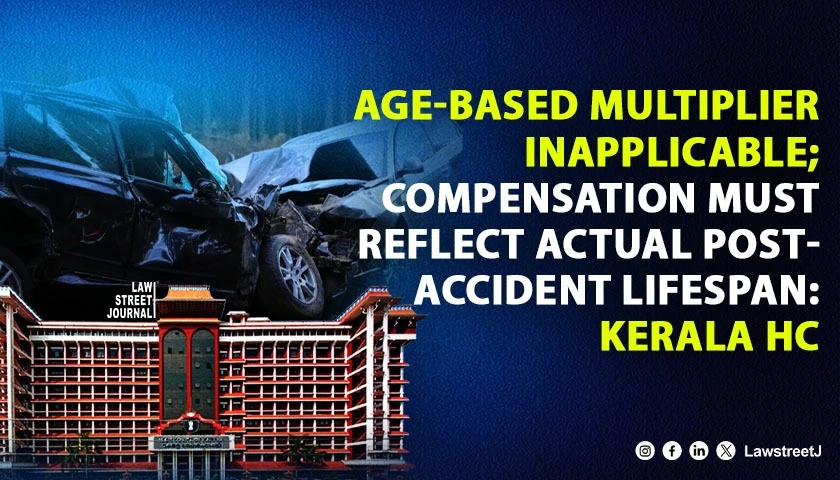Kerala: The Kerala High Court, in a significant Division Bench ruling, has clarified how compensation for future loss of income and permanent disability should be assessed in motor accident claims where the injured claimant later dies from causes unrelated to the accident.
The Court held that in such circumstances, the multiplier used to compute compensation must be restricted to the claimant’s actual lifespan after the accident, overriding the standard multiplier prescribed in Sarla Verma v. Delhi Transport Corporation.
The judgment, delivered on November 17, 2025, by Justices Sathish Ninan and P. Krishna Kumar, resolved a reference that questioned whether the standard multiplier could be applied when the claimant’s shorter, actual lifespan is known with certainty.
The appeals, including The Oriental Insurance Company Ltd. v. Mini Devdas & Ors., raised the central issue of whether the structured formula for disability compensation should be mechanically applied when hindsight reveals that the claimant died earlier due to reasons unconnected with the accident. The Single Judge who made the reference had earlier expressed doubts about a previous High Court ruling, arguing that the right to compensation vests on the date of injury and should not be reduced due to a later unrelated death.
The Division Bench, however, affirmed the precedent in Cholamandalam General Insurance Co. Ltd. v. Shailaja, relying extensively on the recent Supreme Court decision in Dhannalal @ Dhanraj (Dead) through LRs. v. Nasir Khan & Others. The Court emphasized that “just compensation” cannot result in a windfall to the legal heirs. Since the structured formula assumes that the injured would live and earn for the projected number of years, that assumption collapses once the actual lifespan is known.
The Bench concluded that Shailaja (2021) “represents the correct view.” Accordingly, compensation for future loss of income and permanent disability must be assessed using the multiplier corresponding to the actual years the claimant lived after the accident, rather than the standard age-based multiplier.
Applying this principle, the High Court examined two claims:
- Devadasan, an autorickshaw driver who died two years and one month after a 2004 accident due to liver cirrhosis. Although the Tribunal applied a higher multiplier of 16, the High Court found that the Tribunal’s undervaluation of his monthly income (₹3,000 instead of ₹5,000 as per Ramachandrappa) effectively balanced the computation, and thus upheld the total award.
- Seetha, who died 4.5 years after a 2006 accident due to bronchitis and lung abscess. In this case (MACA No. 1056/2012), the Court found no illegality in the Tribunal’s use of a multiplier of 4 but enhanced the monthly income used for the calculation. It granted an additional ₹27,800 as compensation.
The Court accordingly disposed of MACA Nos. 1920/2011 and 2345/2012 by upholding the awards, and partly allowed MACA No. 1056/2012 by granting additional compensation.
Case Name: The Oriental Insurance Company Ltd. v. Mini Devdas & Ors. (with connected cases)




![Kerala HC Quashes 498A Dowry Harassment Case Against Live-In Partner, Citing Lack of Relative Status [Read Order]](/secure/uploads/2023/08/lj_5693_1057c042-1e57-4e27-8c9e-25af0ec38ec4.jpg)
![Watching porn on mobile: Kerala HC highlights importance of mother cooked meals, outdoor sports [Read Order]](/secure/uploads/2023/09/lj_9155_Parental_supervision_of_mobile_phone_usage.jpg)
![Lakshadweep MP Mohammed Faizal Disqualified from Lok Sabha After Conviction Suspension Plea Rejected by Kerala High Court [Read Notice]](/secure/uploads/2023/10/lj_9640_87b5fd97-0e05-4ff8-9a99-3be1e4446192.jpg)




